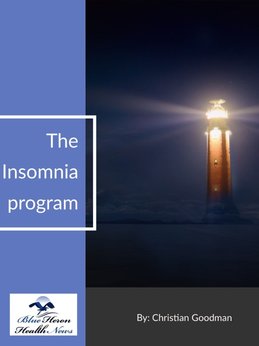
The Insomnia Program™ By Christian Goodman This program has been created by Christian Goodman, a natural health expert and sufferer of insomnia. He has used an audio program to let your fall sleep with the help of a bit of a hypnotic effect on your body.
What are the potential complications of chronic insomnia?
Chronic insomnia, defined as difficulty falling asleep, staying asleep, or waking up too early at least three times a week for three months or longer, can lead to a variety of complications that impact physical, mental, and emotional health. Below are some of the potential complications associated with chronic insomnia:
1. Mental Health Disorders
- Depression and Anxiety: Insomnia is strongly linked to both depression and anxiety. The stress and frustration of not being able to sleep can exacerbate existing mental health conditions or contribute to the development of these disorders. People with chronic insomnia are much more likely to develop mood disorders.
- Increased Risk of Substance Abuse: Individuals with chronic insomnia may turn to alcohol, sleeping pills, or other substances to try to manage their sleep difficulties. This can lead to substance dependence or abuse, which introduces additional health complications.
2. Cardiovascular Problems
- High Blood Pressure (Hypertension): Sleep is critical for cardiovascular health. Chronic insomnia can lead to sustained high blood pressure, which increases the risk of heart disease and stroke. The body requires sleep to regulate stress hormones and maintain a healthy nervous system, which are essential for controlling blood pressure.
- Heart Disease: Poor sleep quality over a long period can contribute to heart-related problems, including heart attacks and heart failure. Insomnia increases inflammation, which is a key factor in the development of cardiovascular diseases.
3. Diabetes and Metabolic Syndrome
- Increased Risk of Type 2 Diabetes: Chronic insomnia can lead to insulin resistance, where the body’s cells do not respond well to insulin. This increases the risk of developing type 2 diabetes. Poor sleep disrupts the body’s ability to regulate blood sugar effectively.
- Metabolic Syndrome: This refers to a cluster of conditions (such as high blood pressure, elevated blood sugar levels, excess body fat around the waist, and abnormal cholesterol levels) that together increase the risk of heart disease, stroke, and diabetes. Insomnia is a significant contributor to metabolic syndrome due to the negative effects on metabolism and weight regulation.
4. Weight Gain and Obesity
- Disrupted Hunger Hormones: Chronic insomnia disrupts the balance of ghrelin and leptin, the hormones that regulate hunger and fullness. Insomnia tends to increase ghrelin (hunger hormone) and decrease leptin (satiety hormone), leading to increased appetite and cravings, particularly for high-calorie, sugary foods.
- Increased Risk of Obesity: Over time, chronic insomnia can contribute to weight gain and obesity. Insufficient sleep can also reduce energy expenditure and lower motivation for physical activity, compounding the risk of weight gain.
5. Cognitive Impairment
- Memory Problems: Sleep is essential for consolidating memories and processing new information. Chronic insomnia can impair short- and long-term memory, making it harder to retain information and learn new things.
- Reduced Cognitive Function: Insomnia leads to impaired attention, concentration, and decision-making skills. This cognitive decline can affect work performance, academic achievement, and daily functioning.
- Risk of Dementia: Long-term sleep deprivation has been linked to an increased risk of neurodegenerative diseases like Alzheimer’s disease and other forms of dementia, as sleep is crucial for clearing toxins from the brain that accumulate during waking hours.
6. Immune System Dysfunction
- Weakened Immune Response: Chronic insomnia weakens the immune system, making the body more susceptible to infections such as the common cold, flu, and other illnesses. It can also slow the recovery process from illness or injury.
- Increased Inflammation: Insomnia is associated with chronic, low-grade inflammation throughout the body, which can contribute to a variety of health problems, including autoimmune diseases and chronic pain conditions.
7. Accidents and Injuries
- Workplace Accidents: Sleep deprivation from chronic insomnia increases the likelihood of accidents and errors in the workplace, especially in jobs that require attention to detail or the operation of machinery.
- Car Accidents: Insomnia-related drowsiness increases the risk of motor vehicle accidents due to reduced reaction times, impaired judgment, and the possibility of falling asleep at the wheel.
8. Social and Relationship Strain
- Impaired Social Interactions: Chronic insomnia often leads to irritability, mood swings, and difficulty handling social situations, which can strain personal relationships and create friction with family, friends, and colleagues.
- Reduced Quality of Life: Persistent sleep problems can result in withdrawal from social activities, leading to isolation, loneliness, and reduced overall life satisfaction.
9. Hormonal Imbalances
- Disruption of Stress Hormones: Insomnia affects the regulation of cortisol, the body’s primary stress hormone. Chronic high levels of cortisol can lead to conditions like weight gain, weakened immune function, and even mental health problems such as anxiety and depression.
- Impact on Reproductive Health: For women, chronic insomnia can interfere with hormone regulation, potentially affecting menstrual cycles, fertility, and menopausal symptoms.
10. Chronic Pain and Fatigue
- Worsening of Chronic Pain Conditions: Insomnia can exacerbate chronic pain conditions like fibromyalgia, arthritis, and back pain. Poor sleep lowers pain tolerance, making chronic pain conditions harder to manage.
- Persistent Fatigue: Chronic insomnia results in ongoing tiredness and low energy levels, which can severely affect daily activities and reduce the ability to function normally.
Conclusion:
Chronic insomnia is more than just a sleep issue; it can have serious and widespread consequences for both physical and mental health. The complications range from increased risks of cardiovascular disease, diabetes, and cognitive decline to mood disorders, weakened immunity, and social dysfunction. Addressing chronic insomnia through lifestyle changes, therapy, or medical intervention is crucial for improving overall health and preventing these potential complications.

The Insomnia Program™ By Christian Goodman This program has been created by Christian Goodman, a natural health expert and sufferer of insomnia. He has used an audio program to let your fall sleep with the help of a bit of a hypnotic effect on your body.